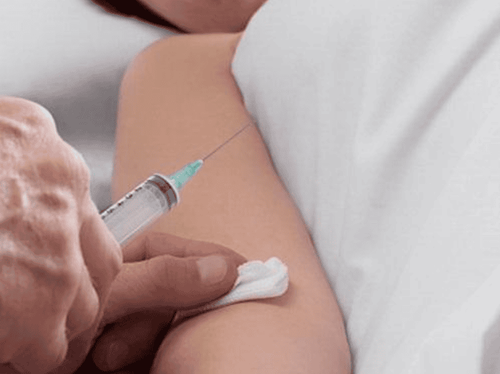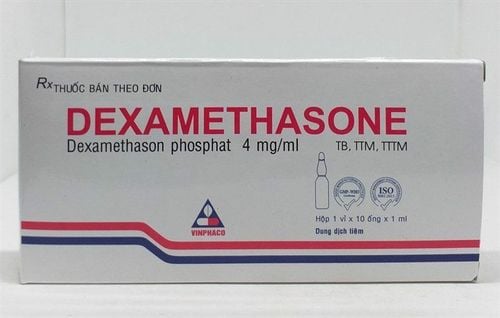This is an automatically translated article.
Bicalox is a prescription drug with two different strengths, so the drug has different effects on prostate cancer. To ensure the effective use of Bicalox, patients need to follow the instructions of a specialist, and refer to more information about the uses of Bicalox in the article below.
1. What are the uses of Bicalox?
1.1. What is Bicalox? Bicalox belongs to the group of anti-cancer drugs and acts on the immune system.
Bicalox medicine includes the following ingredients:
Main active ingredient: Bicalutamide 50mg or 150mg. Excipients: lactose monohydrate, sodium starch glycolate, povidone, magnesium stearate, hypromellose, macrogol 400 and titanium dioxide. The drug is prepared in the form of film-coated tablets of 28 blisters, box of 2 blisters.
Drug Bicalox recommended for use in adult men.
1.2. What does Bicalox do? Bicalox 50 mg tablets are indicated for the treatment of end-stage prostate cancer in combination with luteinizing hormone-releasing hormone (LHRH) analog therapy - drugs that stop the testicles from producing testosterone or surgical removal. Bicalox 150 mg tablets are indicated alone or as adjunct to radical prostatectomy or radiation therapy in patients with localized prostate cancer at high risk for disease progression. It is also indicated for the treatment of patients with locally advanced, non-metastatic prostate cancer for whom surgical resection or other medical intervention is not appropriate.
Contraindications:
Patients who are allergic to the main active ingredient Bicalutamide or any of the excipients of the drug. Women and children under 18 years old; Concomitant administration of astemizol, terfenadine or cisapride with bicalutamide is contraindicated.
2. Usage of the drug Bicalox
2.1. How to take Bicalox Bicalox is taken orally, taking the tablet whole with boiled water to cool. Bicalox is usually taken once daily in the morning or evening. Can be taken before or after meals. Try to keep taking your medication at the same time each day. Treatment with Bicalox and LHRH is usually started at the same time. The patient should follow the doctor's instructions exactly. Injected LHRH is injected or implanted through a needle into the skin around your navel. LHRH injections are given every 4 weeks. Do not increase your dose or take this medicine regularly without your doctor's advice. Not taking the medicine exactly as directed can make your condition not improve faster, but it also increases the risk of serious side effects. Bicalox should not be stopped suddenly. Stopping the medicine suddenly can make your condition worse. 2.2. Dosage of Bicalox Tablets 50mg: One tablet once daily. Treatment with bicalutamide 50mg should be initiated at the same time as treatment with an LHRH agonist.
150mg Tablets: One tablet once daily Bicalox 150 mg tablets should be taken continuously for at least 2 years or until disease progression.
Patients with renal impairment: No dose adjustment of Bicalox is required.
Patients with hepatic impairment: No dose adjustment of Bicalox is required for patients with mild hepatic impairment. Increased accumulation may occur in patients with moderate to severe hepatic impairment. In such cases, a lower or less frequent dose may be considered.
Handling missed dose:
If you miss a dose, take it as soon as you remember, as long as there is at least 12 hours between the two doses. If it is less than 12 hours until the next dose, do not take the missed dose and wait until the scheduled time for the next dose. Do not take a double dose of Bicalox to make up for a missed dose. If you are not sure how, ask your doctor or pharmacist. Overdose treatment:
There is no antidote available. In case of overdose, patients should talk to their doctor, pharmacist for advice on how to handle it appropriately.
3. Notes when using Bicalox
Hyperglycemia: Decreased glucose tolerance has been clinically noted in men taking LHRH agonists. Manifesting as a patient with diabetes or loss of glycemic control in those with pre-existing diabetes. Therefore, blood glucose monitoring should be considered in patients receiving Bicalox in combination with an LHRH agonist. Use in patients with metastatic prostate cancer: In patients with metastatic prostate cancer, treatment with bicalutamide monotherapy is associated with reduced survival compared with total resection. prostate gland. Therefore, Bicalox should not be used without concomitant LHRH agonist therapy in these patients. Use in liver failure: Bicalutamide is extensively metabolised in the liver. Data suggest that its elimination may be slower in subjects with severe hepatic impairment and this may lead to increased accumulation of bicalutamide. Therefore, caution should be exercised when Bicalox is administered to patients with moderate to severe hepatic impairment. Check liver function periodically while taking Bicalox. Because most of these changes occur within the first six months of starting treatment. There have been rare cases of death or hospitalization due to severe liver damage with bicalutamide. Bicalox treatment should be discontinued if at any time the patient develops jaundice or if serum ALT rises above two times the upper limit of normal. Prolong QT/QTc Interval: Deandrogen therapy may prolong the QT/QTc interval. Prescribers should consider whether the benefits of antiandrogen therapy outweigh the potential risks in patients with congenital long QT syndrome, congestive heart failure, frequent electrolyte abnormalities, and in patients receiving the drug. prolong the QT interval. Electrolyte imbalances should be corrected. Consider periodic monitoring of the electrocardiogram and electrolytes.
4. Bicalox side effects
Whole body: Neck pain; Fever; Chills; Sepsis; Herniation; Cardiovascular Cysts: Congestive Heart Failure; Heart attack; Catch the heart; Coronary artery disorders; Gastrointestinal Syncope: Malena; Rectal bleeding; Dry mouth; Dysphagia; Digestive disorders; Periodontal abscess; Gastrointestinal carcinoma Metabolism and nutrition: Edema; BUN increased; Increase Creatinine; Dehydration; Gout; Hypercholesterolemia Skeletal muscle: Muscle pain; Leg cramps Nervous: Increased tone; bewilderment; Sleep peacefully; Decreased sex drive; Neuropathy; Respiratory Anxiety: Lung disorders; Asthma; Epistaxis; Sinusitis Skin and appendages: Dry skin; Hair loss; Itchy; Herpes zoster; Skin carcinoma; Skin disorders Special senses: Cataracts Urogenital : Dysuria; Urination; Hydronephrosis; Urinary Tract Disorders Abnormal Laboratory Values: Laboratory abnormalities including increased AST, ALT, bilirubin, BUN, and creatinine and decreased hemoglobin and white cell counts have been reported in both Bicalox (Bicalox)-LHRH analog-treated patients and flutamide-LHRH analog-treated patients. Go to the hospital right away if you have signs of a serious side effect such as:
Swelling of your face, lips, tongue or throat, which can make it difficult to swallow; Swelling of other parts of the body including the hands, feet, or ankles; Severe shortness of breath, shortness of breath, wheezing, or shortness of breath that suddenly gets worse, possibly with a cough or fever; low red blood cells (anemia)--pale skin, feeling light-headed or short of breath, fast heartbeat, trouble concentrating; liver problems: tired feeling, loss of appetite, nausea, upper stomach pain, itching, dark urine, clay-colored stools, jaundice (yellowing of the skin or eyes); yellowing of the skin or eyes and dark urine; blood in your urine; rash, hives, or severe itching of the skin; High blood sugar: increased thirst, increased urination, fruity breath, hunger, dry mouth, drowsiness, dry skin, blurred vision, weight loss.
5. How to store Bicalox
The shelf life of Bicalox medicine is 36 months from the date of manufacture. Store the drug product at an ideal temperature below 25 degrees Celsius, do not expose the medicine to direct sunlight, high temperature places such as next to the refrigerator, heater or television. Avoid storing the medicine in humid places such as in the bathroom, where the humidity is higher than 70%. Keep medication out of reach of small children. The above are the uses of Bicalox, patients should carefully read the instructions for use and consult a specialist before using the drug to achieve the most effective treatment.













